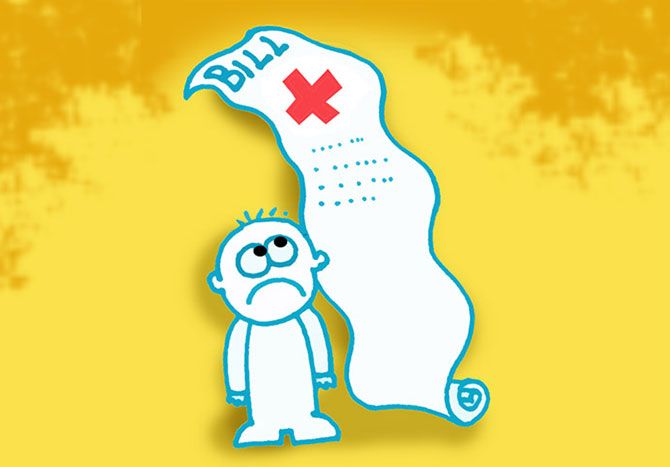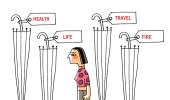Today, quality healthcare in India is expensive and treatment at a decent hospital can finish up your entire savings.
This is where health insurance will come in handy, advises Prashant Jhaveri.

With the number of COVID-9 cases in India increasing, most of us who step out of homes for work and essential shopping will face fear and anxiety in the days to come.
The uncertainty of jobs and financial situation may put significant stress on how to sustain in the degrading economic condition.
In this scenario, proper health insurance with adequate cover can provide certain relief and peace of mind that the health of the family is well protected in case of any unexpected medical exigencies.
Indian health insurance is one of the growing sectors in the economy and has evolved over the years with several insurance companies in the country are expanding their reach and services.
However, the number of uninsured people in India is high and the main reason behind this is that people lack awareness.
Most Indians do not know the difference between life and health insurance.
Today, quality healthcare in India is expensive and treatment at a decent hospital can finish up your entire savings. This is where health insurance will come in handy.
If you have a good insurance plan, you can concentrate on getting the right treatment done.
For a hassle-free experience, it would be best to choose cashless treatment over the reimbursement mode.
Before you buy health insurance, here are some tips to bear in mind:
1. Check for networks with cashless facilities
The cashless claims facility is applicable while the medical treatment takes place in one of the network hospitals of the insurance company.
It is a direct mode of claim settlement by the insurance company to the hospital depending on the sum insured that the patient opted for.
This is one of the most convenient and time-saving processes.
Before hospitalisation, the patient party should check the list of empanelled hospitals of the insurance company and choose accordingly so the insured members can avail cashless treatment in case of a medical emergency.
2. Not everything is payable
It is better to clarify at the TPA (third party administrator help) desk of the hospital what is payable by the insurance company after pre-authorisation.
Sometimes though a hospital may be genuinely charging for all consumables, not everything is payable as per any insurance contract
3. The right procedure and documents
In the time of planned admission, the policyholder should approach the hospital's insurance desk for the procedure to avail the cashless facility.
The insurance desk will forward the patient's pre-authorisation application and the case details to the insurer. In case of any missing documents, the policyholder needs to provide them.
Usually, the approval takes around seven days prior to admission.
4. Check for pre-authorisation
In case of emergencies, ensure that the hospital desk is available during out of office hours for pre-authorization from the insurance company
5. Settlement window
Check with the hospital for the time required for making the discharge summary available to the insurance company.
Usually, insurance companies would take 4 to 6 hours to settle even pre-authorized claims.
6. Be informed about expenses covered
The policyholder should be aware of the expenses covered in pre- and post hospitalisation and ensure that the expenses are claimed through the digital asset of the company or its TPA.
The present healthcare infrastructure in India is not very conducive and the facilities are often overcrowded.
Treatments in a private hospital is very high and it is difficult to meet those expenses from savings.
With unpredictable events like COVID-19, every individual needs to ensure his and his family's safety in preventing the diseases at the same time getting prepared for any worst-case scenario.
A right cashless policy would help avoid last-minute hassles when the patient's family members are to be burdened by worries about the health of the patient and want treatment to be done smoothly.
Prashant Jhaveri represents MediBuddy, an online healthcare provider. He can be contacted at ga@rediff-inc.com











 © 2025
© 2025